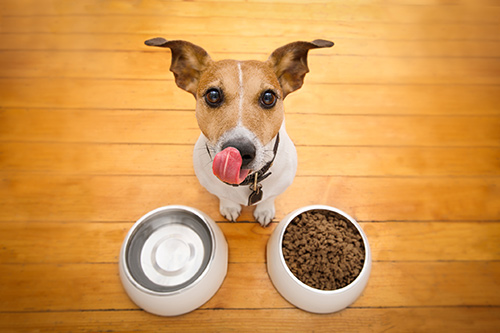
There is an almost endless array of pet foods available in your grocery store, pet superstore, and veterinarian's office. Between the so-called "natural" brands, prescription diets, and everything else in between, it's no wonder that dog owners are confused when it comes to what their pup should eat.
Before you pick a food for Fido or Fluffy, talk to your pet's vet. The veterinarian has the knowledge and expertise to suggest a food that meets your dog's individual needs.
Keep in mind: not every food is for every dog. Your young puppy doesn't have the same nutritional requirements as a senior or sedentary dog, for example. Beyond that, some dogs have allergies or medical conditions that require a special, or even prescription, food.
As you prepare for your pet's next vet visit, take a look at some of the most common keywords you'll hear or see in the dog food world. Knowing what these terms mean can help you better communicate with your veterinarian to find the best food for your dog.
Prescription Foods
These, like the name states, are only available via prescription. Like other medications, a licensed veterinarian must write a prescription for this food. Instead of going to a pharmacy, however, you can typically get prescription foods at the vet's office. Another word you may hear for these common dog foods are "therapeutic" foods.
Why would a dog need a therapeutic food? There are a few different reasons. Some pets have chronic medical conditions that require a regimented type of diet.
Prescription, or therapeutic, foods are specially formulated to help support canine health and recovery. In some cases, the vet will recommend these foods for a dog that is recovering from a surgery, has a nutritional deficiency, has a gastrointestinal condition, or has a serious issue such as cancer or heart disease.
Some dogs may need prescription food if they have allergies. By choosing a prescription food, the vet can help your dog avoid potential allergens, thus reducing the risk of a reaction.
Raw Foods
Again, like the name says, this diet consists of raw foods — primarily raw meats. Instead of buying prepackaged foods, some dog owners prefer to feed their pets real meat. Those who choose this type of diet likely feel that raw foods are fresher and more like an animal's natural diet, and they prefer foods that are free from possible chemical additives and preservatives.
While there is some merit to the idea of making your dog food yourself, without the proper knowledge, homemade pet food can contribute to nutritional deficiencies. This is especially true if your dog has special nutritional needs or certain medical conditions.
Along with the possibility of missing the mark when it comes to your dog's healthy nutrition, raw meats can cause disease. Depending on the type and quality of the meat, you run the risk of infecting your dog with a potentially life-threatening bacterium.
You're also putting yourself and your family at risk: a dog that leaves behind pieces of raw meat or immediately licks a human after eating the bacteria-filled food can pass the germs along, which can lead to serious illness.
Another potentially dangerous issue brought about by a raw meat diet is the possibility of broken teeth or internal puncture from bones. Never feed your dog a raw diet before first consulting with a veterinary professional.
Canned Foods
Canned, or wet, food is available in both over-the-counter (regular store-bought brands) and prescription formulas. While canned food can be more expensive than the dry version, it may be a better choice for dogs with special eating needs. This includes dogs that have dental issues or other reasons for difficulty when chewing.
Dry Foods
Like canned, dry foods are also available in stores and from the vet. Dry food doesn't require refrigeration, making it more cost effective and easier to take on travels than the wet version.
Are you considering switching your dog's food? Contact our vets at Escalon Small Animal Clinic for more information.




